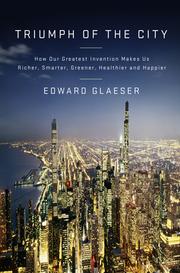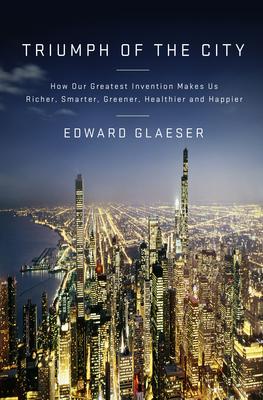Check nearby libraries
Buy this book

A pioneering urban economist offers fascinating, even inspiring proof that the city is humanity's greatest invention and our best hope for the future.
America is an urban nation. More than two thirds of us live on the 3 percent of land that contains our cities. Yet cities get a bad rap: they're dirty, poor, unhealthy, crime ridden, expensive, environmentally unfriendly... Or are they?
As Edward Glaeser proves in this myth-shattering book, cities are actually the healthiest, greenest, and richest (in cultural and economic terms) places to live. New Yorkers, for instance, live longer than other Americans; heart disease and cancer rates are lower in Gotham than in the nation as a whole. More than half of America's income is earned in twenty-two metropolitan areas. And city dwellers use, on average, 40 percent less energy than suburbanites.
Glaeser travels through history and around the globe to reveal the hidden workings of cities and how they bring out the best in humankind. Even the worst cities-Kinshasa, Kolkata, Lagos- confer surprising benefits on the people who flock to them, including better health and more jobs than the rural areas that surround them. Glaeser visits Bangalore and Silicon Valley, whose strangely similar histories prove how essential education is to urban success and how new technology actually encourages people to gather together physically. He discovers why Detroit is dying while other old industrial cities-Chicago, Boston, New York-thrive. He investigates why a new house costs 350 percent more in Los Angeles than in Houston, even though building costs are only 25 percent higher in L.A. He pinpoints the single factor that most influences urban growth-January temperatures-and explains how certain chilly cities manage to defy that link. He explains how West Coast environmentalists have harmed the environment, and how struggling cities from Youngstown to New Orleans can "shrink to greatness." And he exposes the dangerous anti-urban political bias that is harming both cities and the entire country.
Using intrepid reportage, keen analysis, and eloquent argument, Glaeser makes an impassioned case for the city's import and splendor. He reminds us forcefully why we should nurture our cities or suffer consequences that will hurt us all, no matter where we live.
(Source: Penguin Press blurb)
Check nearby libraries
Buy this book

Previews available in: English
Subjects
Long Now Manual for Civilization, Urban economics, Urbanisation, Cities and towns, Urbanization, Stedelijke economie, Forensisme, Villes, Urban sociology, Stadtentwicklung, Stadtökonomie, Stadtsoziologie, Stadscultuur, Verstädterung, Growth, Sociologie urbaine, Economie urbaine, Wachstum, Economic aspects, Städer, Urbanisering, Stadssociologi, Tillväxt, Cities and towns, growth, New York Times reviewed, Sociology, urban, Urban Sociology, POLITICAL SCIENCE, Public Policy, City Planning & Urban Development, SOCIAL SCIENCE, Sociology, Urban| Edition | Availability |
|---|---|
|
1
Triumph of the City: How Urban Spaces Make Us Human
2012, Pan Macmillan
in English
0330458078 9780330458078
|
zzzz
|
|
2
Triumph of the City: How Our Greatest Invention Makes Us Richer, Smarter, Greener, Healthier, and Happier
2012, The Penguin Press
Hardcover
in English
- Paperback
0143120549 9780143120544
|
aaaa
|
|
3
Triumph of the City: How Our Greatest Invention Makes Us Richer, Smarter, Greener, Healthier, and Happier
2012, Penguin Books, Limited, Penguin Books
in English
0143120549 9780143120544
|
zzzz
|
|
4
Triumph of the City: How Our Greatest Invention Makes Us Richer, Smarter, Greener, Healthier, and Happier
Mar 31, 2011, Tantor Audio
1452631697 9781452631691
|
zzzz
|
|
5
Triumph of the City: How Our Greatest Invention Makes Us Richer, Smarter, Greener, Healthier and Happier
May 16, 2011, Penguin Press, Macmillan
hardcover
0230709389 9780230709386
|
zzzz
|
| 6 |
eeee
|
Book Details
Table of Contents
Edition Notes
Classifications
The Physical Object
Edition Identifiers
Work Identifiers
Source records
Internet Archive item recordmarc_openlibraries_phillipsacademy MARC record
marc_openlibraries_sanfranciscopubliclibrary MARC record
Marygrove College MARC record
Library of Congress MARC record
Better World Books record
ISBNdb
Links outside Open Library
Community Reviews (0)
| December 16, 2022 | Edited by MARC Bot | import existing book |
| November 18, 2022 | Edited by ImportBot | import existing book |
| May 25, 2022 | Edited by minoru123 | Add data from archive.org. isbn_9780143120544 |
| May 19, 2022 | Edited by raybb | merge authors |
| July 4, 2019 | Created by ImportBot | import new book |















